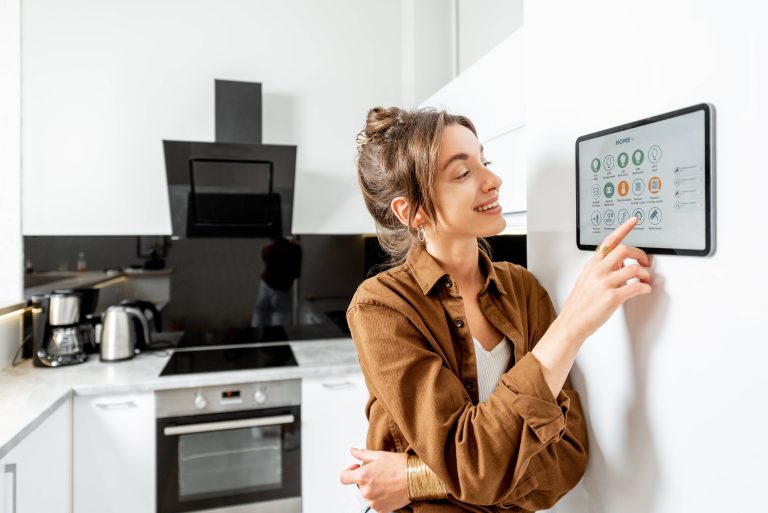
The modern age has ushered in an era of smart technology where even mundane household items have evolved into connected, intuitive devices. Among these innovations is the smart garage door opener – a gadget designed to provide convenience, enhanced security, and interconnectedness with other smart home systems. However, as with any technological advancement, it comes with its own set of security risks and benefits. In this blog post, we’ll explore the security implications and advantages of smart garage door openers, helping you make an informed decision about their integration into your smart home ecosystem.
The Rise of Smart Garage Door Openers
Smart garage door openers represent the evolution from traditional garage door mechanisms to sophisticated devices that integrate with home automation systems. They enable homeowners to open, close, and monitor their garage doors remotely using a smartphone or other internet-connected devices. Brands such as Chamberlain, LiftMaster, and Ryobi have become household names, offering advanced features like real-time notifications, voice commands via virtual assistants (like Amazon Alexa and Google Assistant), and integration with other smart home devices.
Benefits of Smart Garage Door Openers
1. Enhanced Convenience
The most immediate benefit of smart garage door openers is their convenience. No longer do you have to worry about carrying a separate remote control – your smartphone suffices. Whether you’re in your driveway, at work, or on vacation, you can control your garage door with a single tap.
2. Improved Security
Smart garage door openers add layers of security that traditional systems can’t match. Many models offer features like rolling code technology, which changes the access code each time the remote is used, making it almost impossible for intruders to use code-grabbing devices. Additionally, real-time alerts can notify you whenever the garage door is opened or closed, allowing you to monitor activity remotely.
3. Integration with Smart Home Ecosystems
These devices can seamlessly integrate with your existing smart home ecosystem. You can set up routines where your garage door opens automatically as you approach your home, or it locks securely when your security system is armed. Integration with security cameras allows you to visually monitor your garage in real-time.
4. Remote Access and Control
Forget to close the garage door? No problem. With remote access, you can close it from anywhere across the globe. This feature is incredibly useful for granting access to family members, friends, or service personnel without the need for physical keys or garage remotes.
Security Risks of Smart Garage Door Openers
Although smart garage door openers offer numerous benefits, they also introduce potential security risks. Understanding these risks is crucial in mitigating them.
1. Cybersecurity Threats
As with any internet-connected device, smart garage door openers are susceptible to hacking. Attackers can exploit vulnerabilities in the device’s software, potentially gaining unauthorized access. Once an attacker has access, they can open or close the garage door at will, gaining physical entry to your home.
2. Privacy Concerns
Smart garage door openers collect and transmit data about your usage patterns, which can be sensitive. If this data isn’t adequately protected, it could be accessed and used maliciously. Understanding the privacy policies of the device manufacturer and ensuring the data is encrypted is vital.
3. Dependence on Internet Connectivity
Many smart garage door openers rely heavily on internet connectivity. If your internet connection is unstable or experiences outages, you may be unable to control your garage door remotely. Ensuring you have reliable internet service and potentially configuring backup access methods is essential.
4. Compatibility Issues
While integration with other smart home devices is a benefit, it can also pose a risk if there are compatibility issues. Incompatibility can cause malfunctions and unintentional security lapses. Before purchasing a smart garage door opener, ensure it’s compatible with your existing smart home system.
How to Mitigate Security Risks
Despite these risks, there are steps homeowners can take to enhance the security of their smart garage door openers:
1. Choose Reputable Brands
Opt for established brands that prioritize security in their product design. Research reviews and security features before making a purchase.
2. Regular Software Updates
Manufacturers frequently release software updates to fix security vulnerabilities. Ensure your device firmware is always up to date to protect against the latest threats.
3. Strong Passwords and Multi-Factor Authentication
Use strong, unique passwords for your smart garage door opener’s app and enable multi-factor authentication (MFA) if available. This adds an extra layer of security beyond just the password.
4. Secure Your Home Network
Ensure your home Wi-Fi network is secured with strong encryption (WPA3 is recommended) and consider setting up a guest network for your smart devices, isolating them from your main network.
5. Monitor Activity Logs
Regularly check the activity logs of your smart garage door opener for any unexpected or suspicious activity. Many devices allow you to view a history of openings and closings, providing insights into potential security issues.
Conclusion
Smart garage door openers offer a blend of convenience, enhanced security, and integration that traditional systems can’t match. However, with these advantages come potential security risks that must be acknowledged and mitigated. By choosing reputable brands, keeping software up to date, and securing your network, you can enjoy the benefits of smart garage door openers while minimizing the associated risks. As our homes become increasingly connected, understanding and addressing these security considerations will ensure your smart home remains a safe haven.







